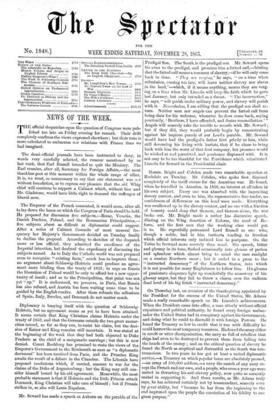The Emperor of the French consented, it would seem, after
all, to lay down the bases on which the Congress of Paris should be held. He proposed for discussion five subjects,—Rome, Venetia, the Danish Duchies, Poland, and the Roumanian Principalities,— five subjects about as difficult as diplomatist could suggest. After a series of Cabinet Councils of most unusual fre- quency her Majesty's Government decided on Tuesday finally to decline the proposal. According to sketches of the despatch more or less official, they admitted the excellence of the Imperial intention, but doubted the expediency of discussing the subjects named. As to Italy the Catholic world was not prepared even to recognize "existing facts," much less to improve them ; no argument about Schleswig-Holstein could produce an agree- ment more binding than the treaty of 1852; to urge on Russia the liberation of Poland would be only to afford her a new oppor- tunity of insult ; and as to the Principalities, that point was not yet "up." It is understood, we perceive, in Paris, that Russia has also refused, and Austria has been waiting some time to be guided by the English resolve. After these refusals the adhesions of Spain, Italy, Sweden, and Denmark do not matter much.






























